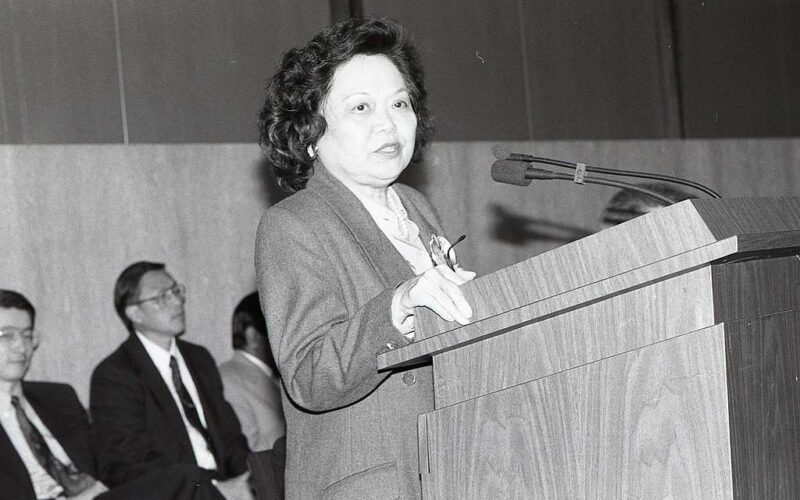Patsy Mink made history in 1964 when she became the first woman of color elected to Congress.
Well known today as the architect of Title IX, Mink began her political career in 1954 when she founded the Oahu Young Democrats. She climbed the political ladder for the next decade, winning a seat in Hawai‘i’s House of Representatives in 1956 and winning election to the Hawai'i Senate two years later in 1958.
“I didn’t start off wanting to be in politics,” Mink once told a reporter. “I wanted to be a learned professional, serving the community. But they weren’t hiring women just then. Not being able to get a job from anybody changed things.”
The third-generation Japanese American grew up on the Hawaiian island of Maui with dreams of becoming a doctor. But after getting rejected from every medical school she applied to, Mink decided to pursue law and attended the University of Chicago, eventually becoming the first Japanese American woman to practice law in Hawai‘i.
When she was elected to the U.S. House of Representatives, she gained what is considered her most historic win—the first Asian American woman to serve in Congress.
During her 24 years in office, split between two 12-year tenures, Mink fought for civil rights, affordable childcare, and more equitable education. She also co-authored Title IX, a landmark amendment of the 1972 Higher Education Act that prohibited discrimination on the basis of sex in higher education.
Her committee assignments included the budgetary committee, the Committee on Education and Labor, and the Committee on Interior and Insular Affairs. She pushed to eradicate the discrimination she faced in her own life, successfully passing the Women’s Educational Equity Act in 1974 to bar sex discrimination in federally funded educational programs.
“We have to build things that we want to see accomplished, in life and in our country, based on our own personal experiences to make sure that others do not have to suffer the same discrimination,” Mink told the Honolulu Star-Bulletin in 1975.
Mink notched another first when she ran for president in 1974—she was the first Asian American woman to do so, entering as an anti-war candidate who ran a campaign to end the Vietnam War. “It is easy enough to vote right and be consistently with the majority,” Mink once said, former Rep. Julia Carson (D-Indiana) noted in a 2002 memorial speech. “But it is often more important to be ahead of the majority. This means being willing to cut the first furrow in the ground and stand alone for a while if necessary.”
After the election, Mink served as an assistant secretary under President Jimmy Carter (D) and was later elected president of the progressive Americans for Democratic Action. She eventually returned to Hawai‘i, serving a stint in the Honolulu City Council and chairing it between 1983 to 1985.
She capped her legacy with a return to national politics in 1990 and served another 12 years in the House until her death. In 1994, she founded the Congressional Asian Pacific American Caucus alongside then-Rep. Norman Mineta (D-California). The caucus would grow to become one of the most powerful AAPI bodies in politics and form coalitions with the congressional Black and Hispanic caucuses.
After her death in 2002, Title IX was renamed the Patsy T. Mink Equal Opportunities in Education Act. In the decades since, she has posthumously returned to the national spotlight as universities reckoned with the prevalence of sexual harassment. Next year, the U.S. Mint will honor Mink in the 2024 American Women Quarters Program.
In a speech at the unveiling of Mink’s portrait last June, Sen. Mazie Hirono (D-Hawai‘i) lauded her as “a champion for social justice, equality, and civil rights.”
“She was a trailblazer in every sense of the world,” Hirono added.









